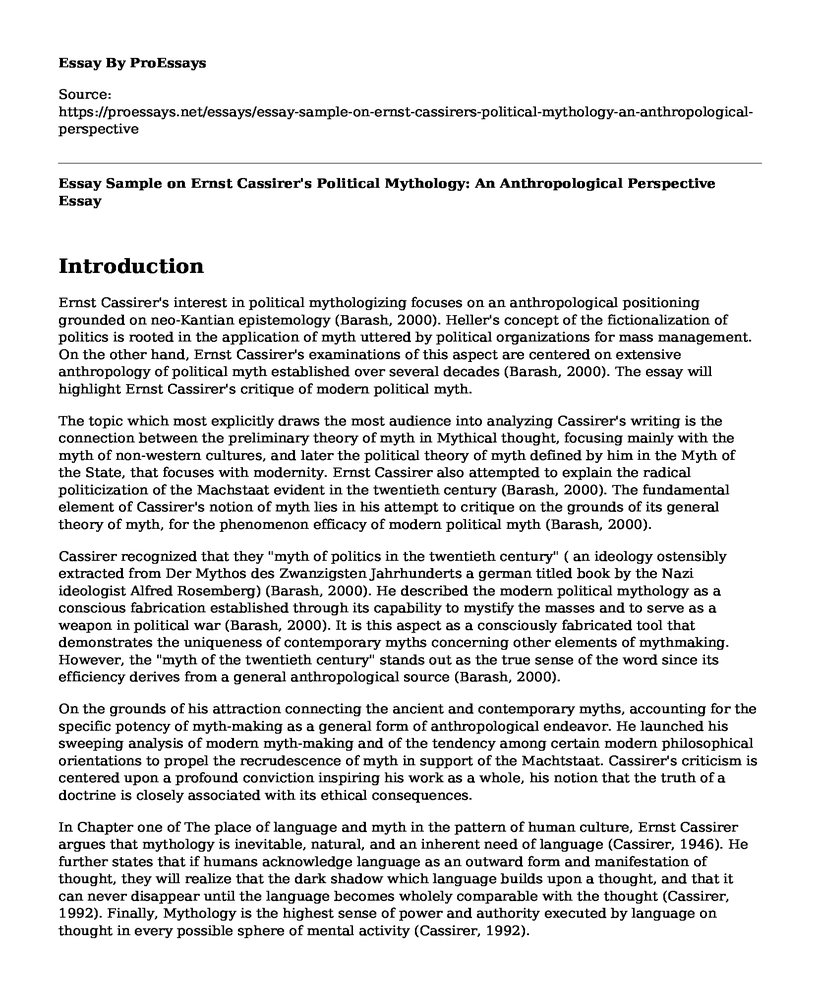Introduction
Ernst Cassirer's interest in political mythologizing focuses on an anthropological positioning grounded on neo-Kantian epistemology (Barash, 2000). Heller's concept of the fictionalization of politics is rooted in the application of myth uttered by political organizations for mass management. On the other hand, Ernst Cassirer's examinations of this aspect are centered on extensive anthropology of political myth established over several decades (Barash, 2000). The essay will highlight Ernst Cassirer's critique of modern political myth.
The topic which most explicitly draws the most audience into analyzing Cassirer's writing is the connection between the preliminary theory of myth in Mythical thought, focusing mainly with the myth of non-western cultures, and later the political theory of myth defined by him in the Myth of the State, that focuses with modernity. Ernst Cassirer also attempted to explain the radical politicization of the Machstaat evident in the twentieth century (Barash, 2000). The fundamental element of Cassirer's notion of myth lies in his attempt to critique on the grounds of its general theory of myth, for the phenomenon efficacy of modern political myth (Barash, 2000).
Cassirer recognized that they "myth of politics in the twentieth century" ( an ideology ostensibly extracted from Der Mythos des Zwanzigsten Jahrhunderts a german titled book by the Nazi ideologist Alfred Rosemberg) (Barash, 2000). He described the modern political mythology as a conscious fabrication established through its capability to mystify the masses and to serve as a weapon in political war (Barash, 2000). It is this aspect as a consciously fabricated tool that demonstrates the uniqueness of contemporary myths concerning other elements of mythmaking. However, the "myth of the twentieth century" stands out as the true sense of the word since its efficiency derives from a general anthropological source (Barash, 2000).
On the grounds of his attraction connecting the ancient and contemporary myths, accounting for the specific potency of myth-making as a general form of anthropological endeavor. He launched his sweeping analysis of modern myth-making and of the tendency among certain modern philosophical orientations to propel the recrudescence of myth in support of the Machtstaat. Cassirer's criticism is centered upon a profound conviction inspiring his work as a whole, his notion that the truth of a doctrine is closely associated with its ethical consequences.
In Chapter one of The place of language and myth in the pattern of human culture, Ernst Cassirer argues that mythology is inevitable, natural, and an inherent need of language (Cassirer, 1946). He further states that if humans acknowledge language as an outward form and manifestation of thought, they will realize that the dark shadow which language builds upon a thought, and that it can never disappear until the language becomes wholely comparable with the thought (Cassirer, 1992). Finally, Mythology is the highest sense of power and authority executed by language on thought in every possible sphere of mental activity (Cassirer, 1992).
In a clue nature of man: the symbol, Cassirer indicates that language does not express thoughts or ideas, but feelings, and affections. Further, religion "within the confinements of pure reason" as voiced, and implement by Kant is not more than just a concept (Cassirer, 1992). It relays only the ideal shape, just the shadow of what a true, and concrete religious life looks like. Ernst Cassirer states that the mental growth of an individual mind can transition from being just a practical one to a symbolic one (Cassirer, 1992). Human culture draws its specific character and its intellectual elements from the language an individual will speak. Vocal language has a great technical advantage over perceptible language (Cassirer, 1992). The emerging growth of symbolic expressions is not deterred by the use of palpable signs in the place of vocal ones. For instance, in the instance a child begins grasping the significance of human language, at that juncture, it does not matter which material he or she used to access the learning (Cassirer, 1992).
Conclusion
In conclusion, Ernst Cassirer's critique of modern political mythologizing focuses on the radical politicization of the Machstaat evidenced in the twentieth century. He states that the myth of contemporary political myth remains a true sense of the word since its efficiency derives from a general anthropological source. He also argues that mythology is certain, natural, and an inherent need for language.
References
Cassirer, E. (1992). An essay on man: An introduction to a philosophy of human culture (Vol. 52). Yale University Press. https://books.google.co.ke/books?hl=en&lr=&id=x46qiaccZLYC&oi=fnd&pg=PA1&dq=Ernst+Cassier,+An+Essay+on+Man:+An+introduction+to+a+philosophy+of+human+culture(Yale+University+Press,+1944),+&ots=jcMm23gsrM&sig=I2-Tb3NpeMEoDcerdccafX4oslc&redir_esc=y#v=onepage&q=Ernst%20Cassier%2C%20An%20Essay%20on%20Man%3A%20An%20introduction%20to%20a%20philosophy%20of%20human%20culture(Yale%20University%20Press%2C%201944)%2C&f=false
Cassirer, E., & Cassirer, E. A. (1946). Language and myth (Vol. 51). Courier Corporation. https://books.google.co.ke/books?hl=en&lr=&id=rxbQwhhRKygC&oi=fnd&pg=PA1&dq=+Ernst+Cassier,+Language+and+Myth(Dover+Books,+1953)&ots=osG7FsdoMY&sig=zNjspGVJjXnJzRrcLSivkzzylbQ&redir_esc=y#v=onepage&q=Ernst%20Cassier%2C%20Language%20and%20Myth(Dover%20Books%2C%201953)&f=false
Barash, J. A. (2000). Political Mythologies of the Twentieth Century in the Perspective of Hermann Heller, Ernst Cassirer, and Karl Lowith. Bulletin du Centre de recherche francais a Jerusalem, (6), 121-133. https://journals.openedition.org/bcrfj/2882
Cite this page
Essay Sample on Ernst Cassirer's Political Mythology: An Anthropological Perspective. (2023, Apr 24). Retrieved from https://proessays.net/essays/essay-sample-on-ernst-cassirers-political-mythology-an-anthropological-perspective
If you are the original author of this essay and no longer wish to have it published on the ProEssays website, please click below to request its removal:
- The Study of Ancient History: Western Civilization
- An Evaluation of How Life Span Approach Explains Human Development - Essay Sample
- Ethics as a Conduct of Life by Using the Socrates Case Paper Example
- Theories of Human Growth and Development Essay Example
- Plato's Apology Essay Example
- Fate in The Iliad: Women & War Prizes - Essay Sample
- Sally's Obligation: Re-Educate Patient on Alprazolam Prescription - Essay Sample







